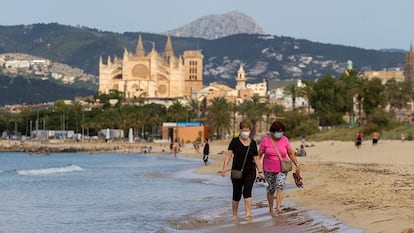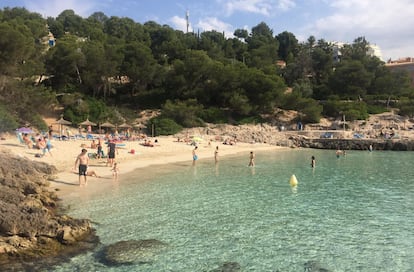Spain’s Balearic Islands to welcome tourists on pilot test from June 15
Some 6,000 German visitors will be allowed to visit the archipelago from next Monday without having to observe the 14-day quarantine, which was introduced in a bid to curb coronavirus contagion

The Spanish government gave the green light on Monday to allow foreign tourists to visit the Balearic Islands on a pilot test from June 15 – more than two weeks before Spain will officially open to international visitors. This program is designed to assess whether the coronavirus safety protocols in airports, hotels, and holiday destinations are working correctly ahead of July 1, when tourists will officially be able return to Spain without being subject to a two-week quarantine.
Only tourists from Germany will be allowed to visit the Balearic Islands on the program, given that the country has a similar epidemiological situation of the coronavirus as Spain, according to sources from the Balearic regional government.

The central government approved the plan on Monday after a meeting between several ministers. The regional Balearic government had been waiting for weeks for permission to proceed with the plan, which will be the first safe travel corridor Spain has opened with other regions of Europe.
The regional premier of the archipelago, Francina Armengol, is expected to provide more details about the tourism pilot test on Tuesday. What’s known so far is that 6,000 tourists from Germany will visit the Balearic Islands – 4,000 in Mallorca, 1,000 in Ibiza and 1,000 in Menorca, according to government sources. These visitors will not have to observe the 14-day quarantine for international visitors, even though the requirement will remain in place in the rest of Spain until July 1.
Canary Islands
The regional government of the Canary Islands has also agreed to take part in a similar pilot project, but wants to introduce tighter safety measures, as it explained in a letter to the tourism state secretary. Sources from the Canaries government said: “We have asked the [tourism] ministry for more safety measures, as we consider those that are included in the pilot test to be insufficient. We have proposed that tourists get tested [for Covid-19], and we are even willing to pay for it.”
The Spanish Tourism Ministry has not yet replied to the letter. For now, foreign visitors will only be allowed to visit the Balearic Islands before July 1. The main obstacle to the program in the Canary Islands concerns the extra safety measures requested and whether these changes can be implemented in such a short time frame. Regional authorities also called on the European Union to provide common guidelines on travel controls.
“A pilot program in these conditions does not make sense for us. We are negotiating with airlines, hotels, the government of Spain and Germany, and we have asked that the EU adopt a common position so that the security controls are homogeneous,” explained sources from the Canary Islands government.
The regional and central governments are continuing to discuss the plan, meaning it will be difficult for international tourists to arrive from June 15. But there is still time.
The coronavirus crisis has devastated the Spanish tourism industry, which accounts for 12% of Spain’s gross domestic product (GDP). As a result of the lockdown measures, not a single hotel was open in April, and not one international visitor showed up, leading to zero tourist spending, according to the National Statistics Institute (INE). Although there has been a slight rise in tourist reservations for August, industry spokespeople say it will not be enough to save the summer season.
English version by Melissa Kitson.
Tu suscripción se está usando en otro dispositivo
¿Quieres añadir otro usuario a tu suscripción?
Si continúas leyendo en este dispositivo, no se podrá leer en el otro.
FlechaTu suscripción se está usando en otro dispositivo y solo puedes acceder a EL PAÍS desde un dispositivo a la vez.
Si quieres compartir tu cuenta, cambia tu suscripción a la modalidad Premium, así podrás añadir otro usuario. Cada uno accederá con su propia cuenta de email, lo que os permitirá personalizar vuestra experiencia en EL PAÍS.
¿Tienes una suscripción de empresa? Accede aquí para contratar más cuentas.
En el caso de no saber quién está usando tu cuenta, te recomendamos cambiar tu contraseña aquí.
Si decides continuar compartiendo tu cuenta, este mensaje se mostrará en tu dispositivo y en el de la otra persona que está usando tu cuenta de forma indefinida, afectando a tu experiencia de lectura. Puedes consultar aquí los términos y condiciones de la suscripción digital.









































